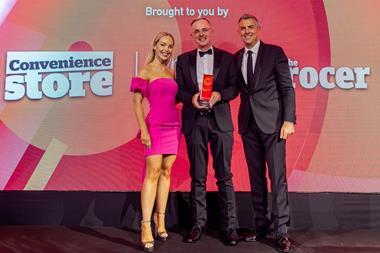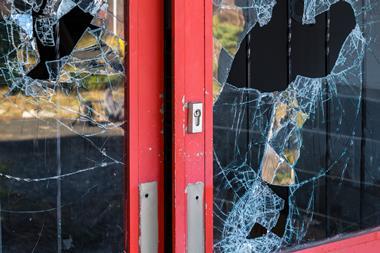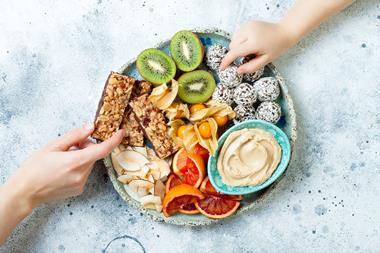Harry Goraya, Rosherville Post Office, Gravesend, Kent
Harry’s food-to-go offering is run by his wife, who incorporates her vegan diet into the food on offer
Craig Cunningham, Abbiecraig Services, Fife
Craig and his sister Abbie have built up strong relationships with food-to-go suppliers to ensure they have an attractive offer
Paul Stone, four Spar stores, Manchester
Paul’s Spar Oxford Road site in Manchester city centre covers food to go throughout the day, from breakfast to evening
Raj Aggarwal, Londis Wigston, Leicester
Raj has had a food-to-go offer fro some years but has refined what’s on the menu to better suit his customer base and demographic
What does your current food-to-go offering consist of?
Harry: We have a hot food counter which focuses mainly on savoury snacks, but we also bake bread in the store.
Craig: Our offering is made up of Rollover hot dogs, sandwiches, hot and cold pies, and snacks.
Paul: We have a full bake-off system that allows us to provide a range of hot food. We also have breakfast meal deals, chilled sandwiches and salads all prepared in our Cheeky Coffee café across the road from the store.
Raj: It’s mostly baked bread and some chilled sandwiches and snacks to go. We also have a hot beverage machine at the store.
When did you introduce it to your store, and why?
Harry: We introduced food to go three years ago. At the time we were looking to find things that would make the shop more appealing to customers, and with no other store stocking freshly baked goods in the area it seemed like a natural fit for us.
Craig: We’ve had some sort of food-to-go offering since we started running the store six years ago. As we’re a forecourt, customers expect there to be food to go and so all we’ve done is expand it over the years in line with the increase in demand from customers.
Paul: It’s been four years in its current form and we first introduced it because our customer base is made up of office workers and students who need somewhere to get lunch quickly. It’s also something to differentiate ourselves from the multiples as they don’t have an offering like this.
Raj: We started food to go quite a few years ago because we felt it was right for the store to have it. When I introduced the category, I had a massive unit because it seemed like the right move for the store.
How has your food to go offering evolved since you first introduced it?
Harry: It’s continually evolving. When it first started we had one staff member plus my wife working on the counter, but now we have three staff working on it at any one time.
Craig: We added in Rollover hot dogs a couple of years back and we’re constantly tweaking the category to improve the offering. You need to have plenty of choices for customers and you can’t let your range go stale or else they’ll go somewhere else.
Paul: It’s always changing and we’re constantly on the lookout for something new to offer customers. Our range is quite broad as we’ve got quite a large customer base and we want to satisfy as many tastes as possible.
Raj: It’s got smaller. When we first had food to go it was a big offering that tried to cover every base, but it wasn’t right for the store and its customer base. Since then we’ve reduced it with a main focus on bakery with some sandwiches from the chiller.
Do you work with a main supplier or have you developed an offering yourself?
Harry: We work mostly with Country Choice, but we have developed our own menu that my wife has created so it uses homemade ingredients. This gives us the best of both worlds.
Craig: We work with as many suppliers as possible, including both Country Choice and Cuisine de France. We don’t make any of the products ourselves in store as we find it’s easier that way. It helps streamline the process.
Paul: Our offering is mostly supplied through Spar, with one or two items from Brakes. Spar provides everything we need so there’s little point in working with someone else. It makes sense to go with them rather than having to spread it out over various different suppliers.
Raj: We work with Country Choice as our main supplier. They’ve been great to work with; when our original offering wasn’t right we worked together to develop a new unit that served my store better.
How beneficial has food to go been to your business?
Harry: It’s not massive in terms of turnover, but it definitely pays for the space it takes up. As we look to expand our offering in the future, I’m hoping it’ll go into double digits in terms of total store turnover.
Craig: Very beneficial. It generates about £1,500 of sales every week, which is a solid amount for any store.
Paul: At Oxford Road, food-to-go sales average about £7,000 a week so it’s very good for our business and certainly worth putting the time and effort into. There are also great margins on the category. In some areas it has cannibalised sales, though. When we introduced hot food we saw sales of chilled sandwiches drop, but it’s still a massive plus for the store.
Raj: It’s another item for customers to pick up. Even though our offering isn’t as big as others, it deserves the space it has in store.
Has introducing food to go brought new customers into your store?
Harry: Adding it has definitely expanded our clientele. My wife is vegan so she prepares meat-free samosas that are very popular with customers and we sell about 100 each day. That’s a lot of additional purchases made at the store.
Craig: We haven’t seen as many new customers, but having food to go means that builders from the nearby sites will come to us because they know they can get a hot lunch at our store.
Paul: Yes, having food to go has been great for cultivating new customers and our wide range has kept them as regulars. There’s a lot of competition in the area so we’ve had to keep our range from getting boring in order to keep those customers.
Raj: We haven’t seen new customers, but shoppers are buying that extra loaf of bread so it has added to basket spend, which is also important.
C-Store Champions apply here
Join our reader panel. Call Aidan Fortune on 01293 610222, or email aidan.fortune@wrbm.com
What new skills or lesson have you had to learn when introducing food to go?
Harry: A lot of it has been common sense, but there have been some hygiene lessons we had to learn when starting out - even simple things such as having separate prepping stations for meat and vegetable products.
Craig: Mostly health and safety. I had been trained in food preparation when I worked at BP so a lot of the skills were relevant for our own offering.
Paul: We learned how to manage a category that requires constant care and attention. We also learned that it’s better to start out small and grow than start big, which can be applied to most categories. It’s better to have a clearly defined smaller range when first introducing it.
Raj: I learned that it’s better to not go big on a category like this and test the water first. A complete food-to-go offering doesn’t suit every store; it all depends on what your customer base is.
How do you manage waste in your offering?
Harry: Managing waste is an important part of food to go. Everything bought in is recorded on epos so we don’t over order on ingredients. We also recycle products that are about to go out of date and use them as ingredients in sandwiches and pies. That helps lower the risk of having any waste.
Craig: There are always a few bits and pieces left over, but the sandwiches are bought in on a sale or return basis so that reduces the risk for us. We try to get as much in on that basis as possible.
Paul: Food to go should all operate in a circle. Grocery products from the store that are about to go out of date are used for ingredients in the café and then any sandwiches not sold in the cafe are boxed up and are sold in the store in the evening. Our waste works out at about £400 per week, but we’ll try to get something back on everything we sell. This works especially well at night.
Raj: There’s always going to be waste in food to go so we bake little and often to ensure that we don’t have stock lying on the shelf for too long as that’s when people are put off.
Do you target a specific time of day with your offering, or do you day-part plan?
Harry: At the moment it’s targeted on breakfast and lunch, but we want to introduce an evening meal option to the store with pizzas that we think would work well.
Craig: We target breakfast and lunch with our offering. There’s a takeaway close to the store so they have the evening meal market covered. There wouldn’t be much point in going into that area and it’s much better to focus on the meals we know we’ll do well in.
Paul: Breakfast and lunch are the main focus, but we’re trying to crack the evening meal opportunity, which is proving difficult. After 10pm people passing by after the pub will come in and they’ll be looking for a snack on the way home, which has proven to be quite lucrative. Between 7pm and 10pm it’s a bit quieter and we’re really looking to see how we can make the most of that timeframe in the category.
Raj: It’s mostly mornings and afternoons when our range sells best. We don’t have much call for food to go in the evening so we don’t waste resources on it. It’s better to focus on the areas that work well than stretch yourself too far.
skills
What staff training have you done in the category?
Harry: All of my staff have been on food safety and hygiene courses, but I also send some team members on retail NVQs which cover food preparation. It means that most of my team can work on the area if needed.
Craig: Because I trained in food to go when I worked at BP, I was able to train the staff in food hygiene rather than outsourcing it to someone else.
Paul: The staff do a one-day course as part of the Spar food-to-go programme and the rest is done on the job. It covers everything they need to know about working with food.
Raj: We’ve done our own food safety training with staff and that offered by Country Choice.
marketing
How do you promote your food-to-go offering?
Harry: We use regular promotions to encourage customers to try our food to go. We regularly run a coffee and snack deal that we rotate every three to four weeks. These are signposted throughout the store to remind shoppers.
Craig: We have signs outside the store highlighting our offering to people driving past. We also have POS in-store reminding customers of what’s on offer at the food-to-go counter.
Paul: We have regular meal deals and promotions that rotate every three weeks. For our Cheeky Coffee brand, we produced branded spoons that gave a free cup of coffee. We also get POS material under the Spar food-to-go programme.
Raj: As well as POS material around the store, we have ‘2 for £1’ promotions on loaves to compete with the nearby multiples. We also highlight how they’re better quality as that’s an important factor to communicate to shoppers in this competitive marketplace.
















![C-Store_Champions_logo-CHOSEN[1] 2023](https://d2dyh47stel7w4.cloudfront.net/Pictures/380x253/6/5/7/301657_cstore_champions_logochosen12023_817064.jpg)




No comments yet